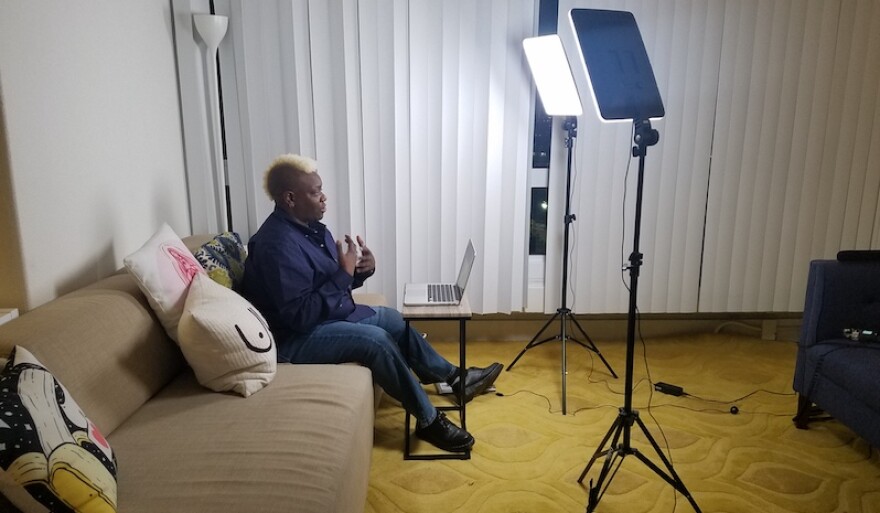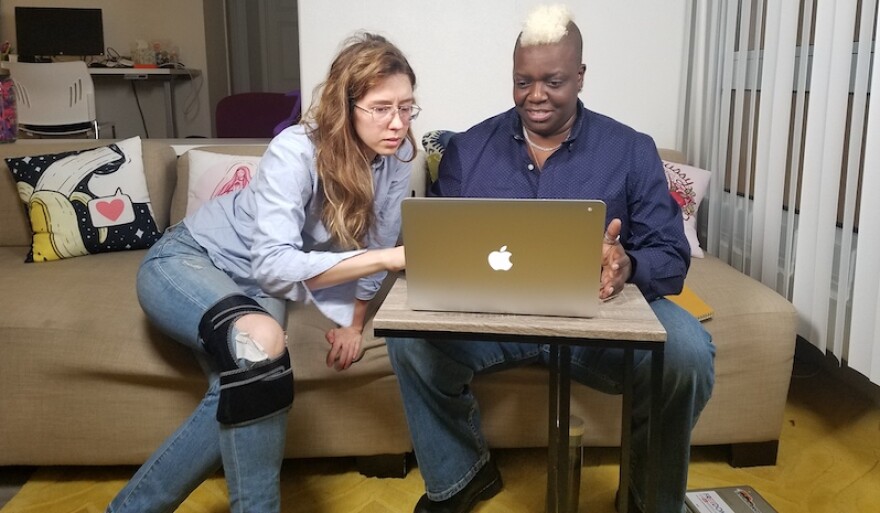In part one of this two-part series, we heard a the history of how sex education has evolved in California. Now, we’re looking to the future, and, of course, it involves tech. Adults who missed out on quality sexual education are turning to apps to help explore and learn about sex. A few Bay Area women are the brains behind these sexual wellness startups.
Sex lessons in session at O.school
It’s Tuesday night at O.school’s headquarters in Oakland. O.school claims to be a judgment-free multimedia platform where adults can learn about sexuality through livestreams, articles, and anonymous online chats. I watch an employee prepare the set for a livestream.
About once a week, one of O.school’s more than 50 “pleasure professionals” lead hour-long educational livestreams. These are O.school’s doctors, therapists, licensed sexologists, and dating coaches. Each has over a decade of experience and there are dozens of O.school experts around the country. Topics encompass anything from simple kissing techniques to navigating sex after childbirth or sexual abuse. Q Wilson is today’s pleasure professional. And today’s topic?
“Non-monogamy! Polyamory, whatever you want to call being in love with more than one person,” Wilson says.
He takes his laptop and nestles on a couch among pillows with boob and vagina designs. Wilson struggles to log into the website because he forgot his password.
“Technology can be wonky sometimes. But when it works, you get to do stuff like livestream to the world [while] talking about non-monogamy as a person who is [a] queer-identified person of color. It’s really, really cool,” Wilson says.

Once up and running, about 30 users trickle in online anonymously or with a screen name. Wilson can’t see them, But they can see him — blond mohawk and all.
“Hey Justin, how are you? Long time no see. I miss you,” Wilson says during the livestream. “If you haven’t already logged in to — hey Dean! Is that Canadian Dean? Because that would be kind of fantastic.”
What Wilson likes about O.school is that the sex experts are culturally diverse. Regardless of how people identify, or where they are in the world, they can log in and see themselves reflected in a pleasure professional.
The person responsible for that concept is O.school CEO Andrea Barrica.
Barrica, a queer Filipino woman and former venture capitalist, grew up Catholic in Folsom — a conservative town in Sacramento County.
“I definitely had questions about my sexuality but I was very scared about what that would mean, considering I was told in church and by my family that homosexuality was a sin and sex before marriage was a sin. So I really turned off those questions,” Barrica says.
She went through adolescence trying to avoid sex — even thoughts about sex.
“I was well into my 20s before I saw my genitals the first time. That’s how seriously ashamed I was,” Barrica says. “My dad worked in technology, so I was sure that if I Googled anything he would know.”
Barrica did what she calls, “the good girl thing.” She graduated high school, went to college and married her high school sweetheart. They had beentogether since they were 15. But, after four years of marriage, her now ex-spouse transitioned to female.
“It was a very elucidating and affirming experience for me,” she says. “And when she came out to me, we cried tears of clarity. We were two queer women all along and we just found each other and we survived together.”
During this period, Barrica finally started asking questions about her sexuality. But there was little information out there.
“There was this huge gaping hole in the middle of Planned Parenthood and PornHub,” she says.
Barrica saw a business opportunity. She eventually quit her job and launched O.school in 2017. Today, O.school’s content has been accessed by people in more than 100 countries. After the U.S., India is the second most active country. The site is free for users because private investors fund it.
Barrica is part of a growing sexual wellness market that includes sex toys, condoms, lubricants, and other pleasure enhancing products. The industry is expected to hit $37 billion dollars by 2022. More online sexual wellness companies have sprouted, like Juicebox.
What’s the tea on Juicebox?
I catch Juicebox’s CEO Brianna Rader before she eats lunch at her home office in San Francisco. Rader is wearing a short-sleeved, black button-down shirt with “Wild Feminist” printed all over it and her signature dark blue-framed glasses.
Rader describes Juicebox as a “sex therapist in your pocket.” For$24 dollars a week, users get paired with professional sex and relationship counselors in the iOS app. Juicebox’s 40,000 users anonymously text their questions to one of the 150 available counselors and the professional responds the next day.
Like Barrica, Rader is queer and also grew up in a small town — Knoxville, Tennesee.
“It’s actually illegal in the Tennessee public school system to teach anything beyond abstinence. If you do, the teachers get fined,” Radar says.
In college, Radar started a small organization in Tennessee. It held a week of sex education for college students. But, she says Tennessee lawmakers found it controversial because it focused on pleasure and was LGBTQ-inclusive.The state defunded her organization and the Tennessee House of Representatives passed a bill legally condemning it.
“I realized for the first time that maybe I don’t want to work in school systems or public policy, but then I was drawn to be more of a practitioner,” Radar says.
After leaving Tennessee, Radar got her master’s degree at UCSF in global health sciences, and later started Juicebox in 2016. Adults like 28-year-old Evan Conoway use the app.
“It’s just like a standard text messaging app,” Conoway explained.

While at Conoway’s kitchen table in Oakland, he shows me how to maneuver through Juicebox. He began using Juicebox after a couple of breakups made him feel so unconfident that he started having erectile issues. The app was more affordable than going to therapy, and he preferred it over taking pills.
“It seemed at first like [the counselor] might be a robot. But it became more clear that this is a real person,” he says.
Conoway’s Juicebox counselor helped him process his breakups and advised he do more things to make him feel confident, like exercising and trimming his beard before dates.
“These are small things that are really easy to do that did eventually, over the course of like a month, build up my self-confidence enough that I don’t really have the same kind of problem that I had before,” Conoway says. “If I had another issue like this come up, I would definitely go back.”
Sex ed experts weigh in
And what do some experts think about these types of sex ed platforms?
“On a personal level, I think that’s great,” says Rosalia Lopez, a sexual health teacher for the San Francisco Unified School District. “As a health educator, I think that’s something that our adult community needs. I’m of the theory that education is throughout our life and it should not stop just because you stopped a formal education.”
While helpful and credible, Juicebox and O.school are new and they’re working out kinks. For instance, O.school is still building its content. One user I spoke with noted there isn’t enough content on asexuality.
Conoway, the Juicebox user, wishes the app’s forums were better organized by topic. His biggest critique though, was that he felt an initial sexuality assessment questionnaire was heteronormative.
"Like when it asked me if I’d had anal sex, I was like, yes smiley face," he says.
The question surprised him after marking that he was a gay male on the form. Rader heard his concerns and Juicebox quickly fixed the issue by creating various versions of the questionnaire, depending on a user’s sexual orientation. Both companies are actively listening to users and working on it. After all, this is just the beginning and there’s much work to be done.
Sex ed tomorrow
In the future, CEO Barrica says O.school content will remain free, but be supported by selling sex toys on the site. It’s also experimenting with sponsorship opportunities.
“Eventually, there are many ways that we plan to make money. But right now we’re just laser-focused on building a trusted brand and being a great resource,” she says.
Juicebox is also advancing. In April it launched Slutbot, a free chatbot for users to practice sexting. They’re also transitioning away from an actual app to users receiving coaching and sex tips through SMS.
Apps and websites are the new norm now. But in the future, sex education may be more tailored and privately accessible than ever before.






